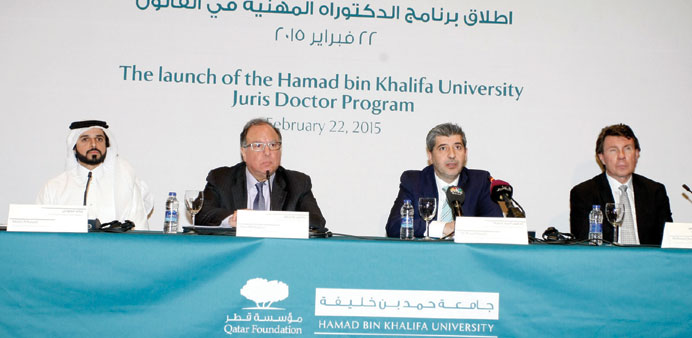QF’s deputy counsel al-Kuwari, NWU-Q School of Law dean Rodriguez, HBKU’s EVP Dr Hasnah and HBKU founding dean Dr Clinton Francis announce the launch of HBKU’s JD programme yesterday.
By Joey Aguilar/Staff Reporter
Hamad bin Khalifa University (HBKU) will launch its juris doctor (JD) postgraduate degree programme this fall in a bid to help further develop the legal educational landscape of Qatar and the region.
“The three-year programme, in partnership with Northwestern University in Qatar, will initially have 20 students,” HBKU executive vice-president and provost Dr Ahmad Hasnah said yesterday.
The JD programme will allow students from other backgrounds and disciplines (such as engineering, accountancy and journalism, among others) to study law.
“This is an important advantage for those who want to aim higher for more leadership positions but they do not necessarily have the legal knowledge or knowledge on public policy,” noted Hasnah.
Considered as the first JD programme in the region, it is designed to deliver specialised legal knowledge to the needs of Qatar, the Middle East and the global community without any additional domestic or foreign degrees.
To be taught in English, the JD curriculum will cover three areas of legal education which include conceptual theory, the function of law, and the application of law.
Dr Hasnah said the programme will provide students the opportunity to make comparative studies between common and civil laws, as well as revitalise the Islamic and Arab principles.
The JD curriculum will be organised around the sectors of energy, infrastructure development, finance and global development, healthcare and cultural endowment and media. The first half of the programme will focus on core legal principles using case studies drawn from these sectors.
HBKU urges students who are interested in exploring a legal education and those finishing their undergraduate studies to apply to the JD programme. They will undergo numerous trainings in contract drafting, trial advocacy, alternative dispute resolution, negotiation, and presentation skills.
“The principal difference between the JD degree and other law degrees is that it is advanced, it has a market place for those who graduated from universities whether they studied law or another field,” said Daniel Rodriguez, Dean of Northwestern University School of Law.
He added that students will benefit from developing key analytical skills needed to attain a very high level of understanding of complex legal concepts. “In turn, Qatar’s society will benefit from having such a highly trained group of strategic thinkers within its workforce in the years to come.”
QF’s deputy counsel Khalid al-Kuwari said the JD programme, while having its own unique features, will also complement Qatar University’s current law school.
About its difference from an LLM (masters of law) degree offered in the US, the UK, Europe, Qatar and in other countries, he said the JD programme does not require students to have an existing degree in law.
Candidates who hold an undergraduate degree in any major from an accredited college or university will have the chance to apply to the programme.
JD is a comprehensive, full-time, law degree while most foreign LLMs can be taken for one year, according to HBKU.
The in-depth legal training gained from a JD programme will provide students with international credentials that open up the opportunities for professional practice and leadership in Qatar and the region.
“It will give a large scope for more research in the local and regional levels and this is something we lack terribly,” said al-Kuwari. “The other point is the method of teaching for us as practicing lawyers, the skills that we acquire during our university years, unfortunately we were thought using the traditional method which is Napoleonic.”
HBKU aims to answer the call for educational institutions within Qatar to build exceptional programmes that are comparable to the best of those offered internationally and which will help develop the knowledge-based economy.

